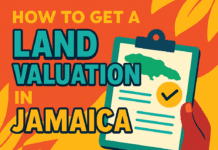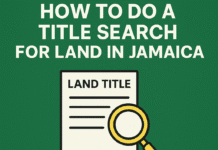How to Buy Land in Jamaica (2025 Guide)
Buying land in Jamaica is one of the best long-term investments you can make — whether for building a home, starting a farm, or creating generational wealth. But to avoid scams and delays, it’s crucial to understand the legal process, required documents, and hidden costs involved.
This 2025 step-by-step guide will walk you through exactly how to buy land in Jamaica safely and legally.
🏝️ Why Buy Land in Jamaica?
- Land value continues to increase islandwide
- You can build your dream home or rental property
- Ownership can be passed down through generations
- Opportunities for farming, business, or tourism use
Whether you’re a Jamaican resident or someone living abroad, the process is accessible with the right knowledge and preparation.
✅ Can a Foreigner Buy Land in Jamaica?
Yes — foreigners are allowed to own land in Jamaica. There are no restrictions on non-Jamaicans purchasing property. However, international buyers may need a local attorney and a Jamaican Tax Registration Number (TRN).
📍 Step-by-Step: How to Buy Land in Jamaica (2025)
Step 1: Get a TRN
Before you can sign any documents, you’ll need a Taxpayer Registration Number (TRN). This applies to both Jamaicans and foreigners. You can get it at any TAJ (Tax Office) or apply online.
Step 2: Start Your Land Search
Look for land listings through trusted sources like:
- Reputable real estate agents
- Official land listing websites
- Bank foreclosure lists
- Classifieds or local referrals
Make sure the land is titled and not “family land,” which is often disputed and harder to transfer legally.
Step 3: Hire a Real Estate Attorney
This is non-negotiable. Your attorney will:
- Conduct a title search to verify ownership
- Draft or review the Sale Agreement
- Handle stamp duty and registration documents
Pro tip: Choose an attorney who is experienced in land transactions and registered with the Jamaican Bar Association.
Step 4: Make an Offer and Sign the Sale Agreement
If you’re satisfied with the land, your attorney will help you make an official offer. If accepted, both buyer and seller sign a Sale Agreement. You’ll usually pay a 10% deposit at this stage.
Step 5: Pay Government Fees
Several fees must be paid to finalize the purchase:
- Stamp Duty: 4% of the property value (2% paid by buyer)
- Registration Fee: 0.5% of sale price
- Attorney’s Fees: 2%–3% of the sale price (plus GCT)
- Land Transfer Tax: Usually paid by seller, but confirm in agreement
These fees are usually handled through your lawyer’s trust account.
Step 6: Final Transfer and Title Registration
Once payment is complete and documents are signed, your attorney submits the paperwork to the National Land Agency (NLA). Processing may take 30–90 days depending on backlog.
When completed, you’ll receive a Certificate of Title in your name — making you the official landowner.
💡 Tips for Buying Land in Jamaica
- Always check for an official title — don’t assume ownership based on word-of-mouth
- Ask about zoning restrictions and land use (residential, commercial, agricultural)
- Visit the land in person if possible — or send a trusted representative
- Double-check if there’s road access and utility connections
- Watch out for “squatter land” and avoid cash-only sales
📊 Typical Land Prices in 2025 (Jamaica)
- Rural Areas: JMD $500,000 – $2,000,000 per acre
- Suburban/Residential: JMD $3M – $10M per quarter acre
- Urban or Prime Locations: JMD $15M – $100M+
Prices vary greatly by parish and development status. Clarendon, St. Catherine, and sections of St. Elizabeth offer great value. Kingston and Montego Bay are much higher.
🔗 Related Guides on HowToJA.com
- How to Get a Land Valuation in Jamaica
- How to Transfer Car Ownership in Jamaica
- How to Get a TCC in Jamaica
📞 Helpful Contacts
National Land Agency (NLA)
Website: nla.gov.jm
Phone: (876) 750-5263
Email: info@nla.gov.jm
🏗 What to Do After Buying Land in Jamaica
Once the land is officially transferred to your name, you’ll want to take a few extra steps to protect and maximize your investment:
- Fence or mark the boundaries: This helps prevent squatting or disputes.
- Get a recent land valuation: Especially if you plan to build or use the land as collateral for a loan.
- Check your parish’s property tax rates: Landowners are required to pay property taxes annually in Jamaica.
- Visit the local parish council: If you plan to build, confirm that your structure meets local zoning laws and development regulations.
You can also speak to a certified land surveyor to help you create or confirm your official plot boundaries if they’re unclear. The National Land Agency (NLA) also offers online services to check title status and land details.
🌱 Buying Land for Farming in Jamaica
If you’re interested in agriculture, buying land in rural Jamaica can be a smart and affordable option. Here’s what to consider:
- Choose land with easy access to water or irrigation systems
- Check for soil quality and slope — especially for crops like yam, plantain, or sugar cane
- Consider government programs that support farming startups, like RADA or MICAF
Many successful farmers in Jamaica started with less than an acre and built profitable operations through careful land use, crop rotation, and persistence.
🏁 Summary
Whether you’re buying land to build, farm, or invest, understanding the Jamaican land purchase process is the key to avoiding regrets later. Don’t rush the process. Do your due diligence, work with professionals, and treat every signed paper as a permanent legal step. In the end, land is one of the few assets that grows in value and leaves a lasting legacy.






[…] How to Buy Land in Jamaica (2025 Guide) […]